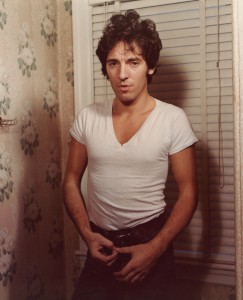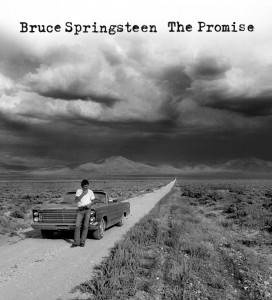Springsteen Settles Up With The Past On "The Promise"
posted in: Features • Music News • Pop • Rock
 These days, the words Bruce Springsteen often seem like they denote a religion rather than a flesh-and-blood human being. The Jersey giant’s iconic stature has swelled to such an extent over the last three decades that it’s difficult to imagine a time when Springsteen was just a rough-and-tumble rocker still cementing his legend, and not yet a monolithic figure for whom no surname is necessary. But The Promise permits a peek back into the mid ˜70s”a time before many of today’s Springsteen fans were even born”providing a portrait of a very different Bruce.
These days, the words Bruce Springsteen often seem like they denote a religion rather than a flesh-and-blood human being. The Jersey giant’s iconic stature has swelled to such an extent over the last three decades that it’s difficult to imagine a time when Springsteen was just a rough-and-tumble rocker still cementing his legend, and not yet a monolithic figure for whom no surname is necessary. But The Promise permits a peek back into the mid ˜70s”a time before many of today’s Springsteen fans were even born”providing a portrait of a very different Bruce.
Even after the 1975 masterpiece Born To Run put the scruffy king of undershirt rock’s name on the world’s lips, it was still too early to be assured of Springsteen’s staying power. He was at a crucial point in his career, where he could either pick up the artistic gauntlet laid down by the aforementioned album or let the brass ring slip through his fingers, and just as he was getting ready to grapple with that, fate threw a monkey wrench in the works. Differences between Springsteen and his manager, Mike Appel, resulted a long, painful legal battle that prohibited Bruce from making an album until it was resolved. During that long winter of the soul, the songwriter amassed dozens and dozens of powerful songs, fueled by his frustration. When the smoke cleared and the time finally came to record Darkness On The Edge of Town, Springsteen had enough material for six or seven albums, and a lot of great tracks inevitably got left behind. That’s where The Promise comes in.

Courtesy of Shorefire Photo Credit: Frank Stefanko
Thirty-plus years after the fact, The Promise goes spelunking in the Springsteen archives on a rescue mission to recover the best of the lost tracks from the Darkness sessions. It exists in two versions”a two-disc collection of the twenty-two recovered tunes, and deluxe edition that also includes a remastered Darkness and three DVDs, containing two live shows of Darkness material along with a Promise documentary film. Listening to The Promise is like getting a glimpse into an alternate universe where the Springsteen legend developed differently. For one thing, we hear The Boss’s own hard-charging versions of songs he ended up giving to other artists. What would have happened if Patti Smith, Southside Johnny & The Asbury Jukes, and The Pointer Sisters were denied career-making tunes like Because The Night, Talk To Me and Fire, respectively? Then there are songs that did make the Darkness cut, presented in earlier versions, like Candy’s Boy (which became Candy’s Room with a radically different arrangement) and Racing In The Street, offering hints at the nature of Bruce’s editing process.
Of course, the meat of The Promise is the bounty of compositions that were left behind. From the romantic reverie of the Brill Building pop-tinged The Little Things (My Baby Does) and the measured, mid-tempo melancholy of the bittersweet Come On (Let’s Go Tonight) to the very Darkness-sounding anthem of alienation Outside Looking In and the smoky, wee-hours urban romanticism of City Of Night, this collection delivers consistently, cut for cut. So, would Springsteen’s star have ascended even faster if these songs were released in ’76 or ’77? Would they have somehow taken his career down a different path? Would Patti Smith and The Pointer Sisters, denied of their biggest hits, be working hotel lounges today? The Promise can’t answer any of these questions, but it presents some tantalizing possibilities.

- Racing In the Street (’78)
- Gotta Get That Feeling
- Outside Lookin In
- Someday (We’ll Be Together)
- One Way Street
- Because The Night
- Wrong Side of the Street
- The Brokenhearted
- Rendezvous
- Candy’s Boy
- Save My Love
- Ain’t Good Enough for You
- Fire
- Spanish Eyes
- It’s a Shame
By Jim Allen
Jim Allen has contributed to a wide range of print and online outlets including RollingStone.com, MOJO, Village Voice, Uncut, VH1.com, iTunes, All Music Guide, CMT.com, The Advocate, Prefix, Blurt and many more.
